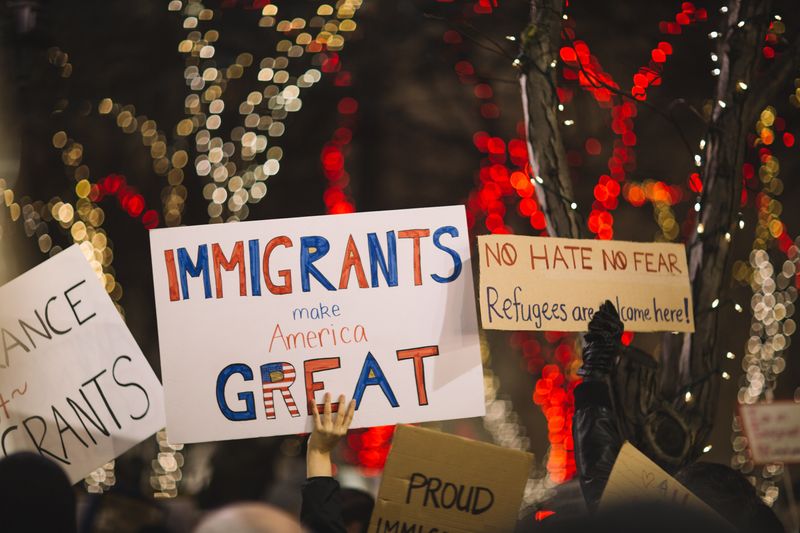Do sanctuary cities “breed crime” and does a disconnect exist with the Fed and police forces?
Thirty-eight years ago, the Chief of the Los Angeles Police Department (LAPD) Daryl Gates signed off on Special Order 40, which separated the responsibilities of local law enforcement from federal immigration enforcement. The 1979 policy continues to influence how police officers interact with immigrants today. In 2013, the state of California passed a law that prohibited local police from detaining an individual on the basis of his or her immigration status. The limited cooperation between law enforcement and federal agents resulted in the city being labeled a ‘sanctuary city’ soon after. Though a concrete definition for ‘sanctuary cities’ has not been devised by President Trump’s administration, many cities, counties, and states are adopting sanctuary policies. Cities where sanctuary policies are in place focus on the crime committed rather than the citizenship status of the individual. This leaves the responsibility of enforcing federal immigration laws solely on U.S. Department of Homeland Security Immigration and Customs Enforcement rather than local law enforcement.
Critics of ‘sanctuary cities’ such as Attorney General Jeff Sessions and former ICE Assistant Secretary Julie Myers Wood claim that they “breed crime,” which stemmed from a comment made by Trump in an interview on Fox News’ Bill O’Reilly. According to a survey conducted by Loyola Marymount University researchers, however, 72% of Los Angeles County residents support the city’s status as a ‘sanctuary city’ where undocumented immigrants are protected from deportation. Additionally, local officials have expressed in The New York Times that they welcome sanctuary policies and that it is a “good policy both from a legal standpoint — in the past, they have faced lawsuits over honoring immigration detainers — and from a public safety standpoint, making immigrants more likely to come forward to report crimes and serve as witnesses.” Sanctuary cities create a ‘safe space’ for residents, citizen or not, to alert law enforcement about criminal activity.
“We need to become a united front against this attack on Latino immigrants, both documented and undocumented.”
Similar to the city of Los Angeles, neighboring ‘sanctuary cities’ such as Santa Monica, Santa Ana, and West Hollywood filed court briefs against President Trump’s executive order to withhold federal funds. In the same NY Times article, writers Vivian Yee and Rebecca R. Ruiz note that Attorney General Jeff Sessions declared that “cities and states could lose millions of dollars in federal grants unless they began cooperating with immigration agents,” even though the sanctuary policies enacted within these cities comply with federal law. If Trump takes away federal funds from jurisdictions that do not comply with immigration laws, it “would threaten public health and safety… [and] would lead to a loss of cooperation between immigrants and police” says SoCal Patch (Patch Staff).
In contrast, there are cities and counties in Texas that are attempting to implement anti-sanctuary policies. The state of Texas’ new anti- “sanctuary city” law is said to be similar to Arizona’s SB 1070 which is arguably unconstitutional. Both laws allow law enforcement to ask someone they pull over for papers or documentation. Also, The Los Angeles Times writer Jenny Jarvie mentioned in an article that Senate Bill 4 (SB 4) imparts harsh penalties on local law enforcement who do not comply with the law or withhold information from federal immigration agencies. SB 4 has not been implemented yet and is said to be on hold until its language becomes more specific. In regards to several police departments and area population demographics in Texas, there is a racial divide between law enforcement agencies and the locals they protect. In a Reporting Texas analysis of Texas Commission on Law Enforcement, University of Texas at Austin students found and reported that “in 48 counties, every licensed peace officer working for the local sheriff’s office was white.” However, a majority of white peace officers do not mirror even half of the community. The 2013 Latino population in Dallas, Texas, was 41.8% with only 18.4% Latinos making up the police force. These statistics are completely opposite of the demographics of the Los Angeles Police Department, where the racial makeup of the police force is almost identical to the population. In a racial profiling report conducted in February 2017 for the Dallas Police Department, Latinos were the ethnicity most pulled over or stopped and searched by the police. Given the reports and data on discrimination and prejudice issues in Dallas, it is clear why Texas would desire to implement a corrupt law that allows racial profiling.
Dallas is a perfect example of why we need sanctuary policies. Residents should not be stopped because of the color of their skin or taken away from their families and careers because of their citizenship status. President Trump cannot use federal grant money as political leverage to win the fight against “illegal immigrants.” Cutting federal funds from the sanctuary states and cities would result in a loss of educational programs, critical training, and funding from community members, local government officials, and law enforcement. The way I see it, people should not be used as pawns in a game. Our loss does not equal Trump’s gain. If we lose, he does too and so does everyone else because immigrants contribute significantly to the U.S. economy and workforce.
Adversaries and allies of sanctuary cities must remember that this country was built on the backs of immigrants. It is immigrants’ basic rights that are at stake. As a result, I encourage Angelenos to get involved in local non-profit organizations such as Coalition for Humane Immigrant Rights of Los Angeles, Latinos Unidos Inc., DREAM Team Los Angeles (DTLA), and many more organizations that educate, provide services to, and advocate for immigrants. This is a human rights issue that affects communities across the nation. We need to become a united front against this attack on Latino immigrants, both documented and undocumented.






